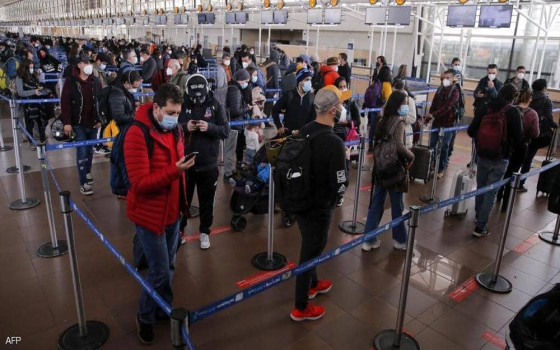
European Justice: It stipulates that tourists in Europe have the right to recover their money after canceling the holiday due to Corona restrictions

- Europe and Arabs
- Thursday , 12 January 2023 22:21 PM GMT
Brussels: Europe and the Arabs
The European Court of Justice in Luxembourg granted the right to tourists from Germany to obtain their money, which they demanded after canceling the tourism program that they planned for in Spain, due to the outbreak of the Corona epidemic.
The European Union's highest court said Thursday that many travelers in Europe due to coronavirus restrictions "may be entitled to at least a partial refund of their money," according to Sky News.
The European Court of Justice considered the matter, after a court in Germany asked for its opinion, according to the Associated Press.
The Munich Court is considering the case of two people who bought an organized trip, on a two-week vacation on the Spanish island of Gran Canaria, starting from March 13, 2020, at a time when the pandemic hit Europe.
The two people are seeking to reduce the price by 70 percent, due to the restrictions imposed there after two days and their early return.
The EU court said that when the restrictions were imposed on March 15, beaches were closed, a curfew was imposed and the two people were only allowed to leave their hotel room to eat.
On March 18, they were told to "be ready to leave at any moment," and two days later they had to return to Germany. The tour operator refused the requested reduction, on the grounds that it could not be held responsible for a "general risk to life".
But the European Union court concluded that “the traveler is entitled to a reduction in the price of his package, as the non-conformity of the travel services included in the package came due to the restrictions that were imposed at the travel destination to combat the spread of an infectious disease, such as Covid-19.”
And she considered that "it does not matter if similar restrictions are imposed in the place of residence of the traveler or in other countries."
The German court will now have to assess whether the restrictions in the specific case at hand "could constitute failures of performance or improper performance" of the contract by the tour operator.
On the other hand, representatives of the member states’ governments appointed Ms. Beatrix Reziova as a judge of the General Court of the European Union for a term of office that ends on August 31, 2028. The appointment took place as part of the partial renewal of the composition of the General Court in 2022. This is a renewal of the term of Ms. Reziova. She was first appointed as a Judge of the Common Court on 29 June 2022 and entered office on 6 July 2022.
Judges and attorneys general are appointed by mutual agreement of the governments of the Member States after consultation with a committee responsible for expressing an opinion on the suitability of potential candidates to perform the functions concerned. They are chosen from among individuals whose independence is beyond doubt. To be appointed to the General Court, they must have the ability required to be appointed to a senior judicial position and the role of the Court is to ensure that EU law is interpreted and applied in the same way in every EU country; Ensuring that states and EU institutions comply with EU law.
The Court of Justice includes: one judge from each country of the European Union, in addition to 11 public defenders, and the Court of Justice: two judges from each country of the European Union. To ensure that it is applied in the same way in all EU countries, and to settle legal disputes between national governments and EU institutions.
It can also, in certain circumstances, be used by individuals, companies or organizations to take action against an EU institution, if they feel it has violated their rights in some way.












No Comments Found